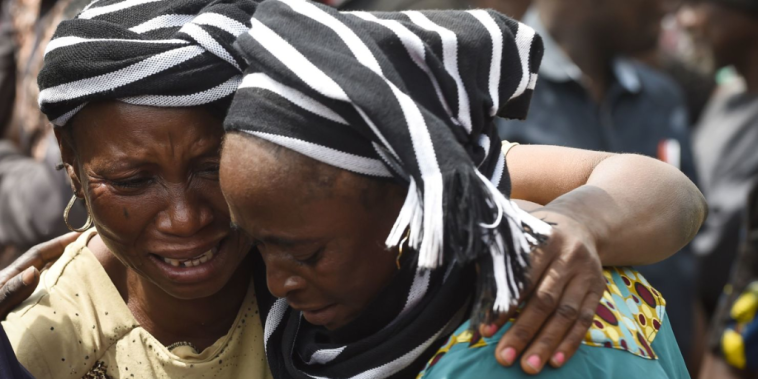On Friday, June 13, suspected herders launched a late-night attack on the Yelewata and Daudu communities in the Guma Local Government Area (LGA) of Benue State. The attack reportedly left about 200 people dead and displaced over 6,000 more.
Speaking to Vanguard, Matthew Mnyan, a community leader from Yelewata, described how the attackers overpowered local police and youth efforts. According to him, the assailants struck from two fronts — the eastern and western parts of Yelawata — making it difficult to hold them back.
“They killed our people, poured petrol on the stalls in the market and burnt them,” he explained. “In those stalls, we had people who moved from places like Branch Udei and people displaced from nearby villages, who slept in them because of the proximity of the Police and soldiers there. And we learnt no soldier came out to defend the people.”
Get More Zikoko Goodness in Your Mail
Subscribe to our newsletters and never miss any of the action
Maurice Orwough, Chairman of Guma LGA, also confirmed the attack, stating that many had been killed, though he did not provide specific details.
This was not an isolated incident. Before the Friday attack, there was also the June 1 attack in Naka, which claimed several lives; the attack on May 9 across four LGAs (Guma, Logo, Ukum, and Kwande), the April 17 attack in Ugondo, Tyuluv, and Gbagir communities that reportedly claimed over 56 lives. These are just a few examples from a long, tragic list.
As outrage continues to mount over these relentless, gruesome Benue attacks, one question has remained constant: What is driving the ongoing violence in Benue State?
The history behind the never-ending Benue attacks
The killings in Benue State did not start this year or last year. They actually go back decades. In fact, some historians trace the conflict as far back as the colonial era.
At one time, farmers and herders had a cordial, even symbiotic, relationship. They exchanged resources and coexisted peacefully. But that balance was disrupted with the introduction of colonial policies, particularly around land ownership.
The most significant shift came with new laws that enabled colonial Europeans to privatise and claim large portions of land. As a result, indigenous communities were left with less land to farm or graze, fuelling tensions over increasingly scarce resources — a conflict that continues to this day.
Climate change
Beyond the scarcity of resources, climate change has further worsened the situation. Large expanses of land in northern Nigeria have dried up due to the effects of desertification, further reducing available grazing land. As a result, more herders have been forced to migrate south in search of greener pastures, often into farming communities in the Middle Belt, where Benue is located.“Climate change is a new challenge that we didn’t experience 20 or 30 years ago; it’s really impacting us,” said Ibrahim Galma, Secretary of the Miyetti Allah Cattle Breeders Association (MACBAN), in a 2024 interview with the United Nations High Commissioner for Refugees (UNHCR).
This movement has sparked tensions on both sides. Farmers accuse herders’ cattle of destroying their crops, while herders complain that cultivated farmland now blocks traditional grazing routes. The result has been a seemingly endless cycle of conflict.
In 2017, the Benue State government attempted to curb the violence by signing the Anti-Open Grazing Law, which bans open grazing and promotes ranching instead. But the law has been met with resistance from herders, who argue it unfairly targets them.
Former President Muhammadu Buhari also promoted ranching as a long-term solution.. In 2019, his administration introduced the National Livestock Transformation Plan (NLTP), which aimed to encourage herders to adopt ranching. Though he secured a €400,000 (₦188.5 million) grant to pilot the scheme in select states, the plan ultimately struggled to take off. Its failure has been attributed to “deficient political leadership, popular misperceptions about its purpose, budgetary constraints aggravated by the COVID-19 pandemic, a lack of personnel with the expertise to carry it out and widespread insecurity.”
Easy access to small arms and weapons
The availability of small arms and weapons has made the conflict between farmers and herders even more deadly. In the past, disputes over land or resources were often resolved through dialogue, mediation, or other traditional means. But with easier access to weapons, these disagreements now frequently escalate into violent clashes and retaliatory attacks that leave many dead, wounded and displaced.
Attah Jesse Attah-Olottah, Risk Operations and Intelligence Coordinator at Beacon Security and Intelligence Limited (BSIL), told Zikoko Citizen why these weapons are so easy to come by.
“The proliferation of small arms and weapons is twofold — the internal and external avenues,” he said.
Internally, Attah-Olottah explained that the weapons find their way into the hands of farmers and herders through different non-state actors operating across the country. These include “the quiet militancy in the South-South, the Indigenous People Of Biafra (IPOB) and its militia network in the Southeast, as well as rural bandits and ideological terrorists up North.”
On the external front, Nigeria’s weak border security has made arms smuggling even easier. Atta-Olottahn pointed to Nigeria’s neighbours — Cameroon, Chad, and Niger Republic — as major sources of illicit weapons, given their security issues.
“Nigeria is situated in what is described as an ‘arch of violence’ or ‘arch of instability’,” he said. ”Every country around Nigeria is experiencing some level of instability,” he added, emphasising that this position, coupled with weak border security, encourages arms smuggling.
What are the solutions to the violence?
While some interventions have been introduced — such as Benue’s Anti-Open Grazing Law and Buhari’s National Livestock Transformation Plan (NLTP) — Attah-Olottah believes these efforts have fallen short. According to him, the government has failed in its responsibility to protect all Nigerians, not just one group.
“Where laws are not really being put in place to find lasting solutions that would support all parties of the conflict, it further exacerbates tensions and causes great levels of division between both parties,” he said, explaining that the government needs to do more to find lasting solutions to the problem.
But while Nigerians wait for these solutions, Attah-Olottah believes that the government can do more to protect the lives and property of citizens in at-risk communities.
“The Nigerian custom, for example, has an aerial asset, which it uses for its operation. The Nigerian immigration can collaborate with customs to utilise its aerial assets, which by the way is very underutilised in terms of border control and monitoring the fringes of the Nigerian border to stop and detect the movement of illegal persons and influx of weapons in the country,” he said.
He also outlined broader security measures like better detection, deterrence, early warning systems and early response strategies to prevent and manage attacks, among other solutions.
In addition to all these, Attah-Olottah also thinks the government’s failure to identify perpetrators of specific attacks has seen it fail in its duty to ensure that justice is served to victims.
“We need proper systems that allow for the identification of actors and for justice,” he said.
He emphasised that justice isn’t just about having laws on paper; it requires a functioning, trustworthy judicial system. “What we currently have in the Nigerian judiciary has made many citizens lose faith in the justice system,” he added, explaining that the system often allows perpetrators of violence to “manoeuvre around the laws and find freedom,” even after they’ve been arrested and charged in court.





GIPHY App Key not set. Please check settings